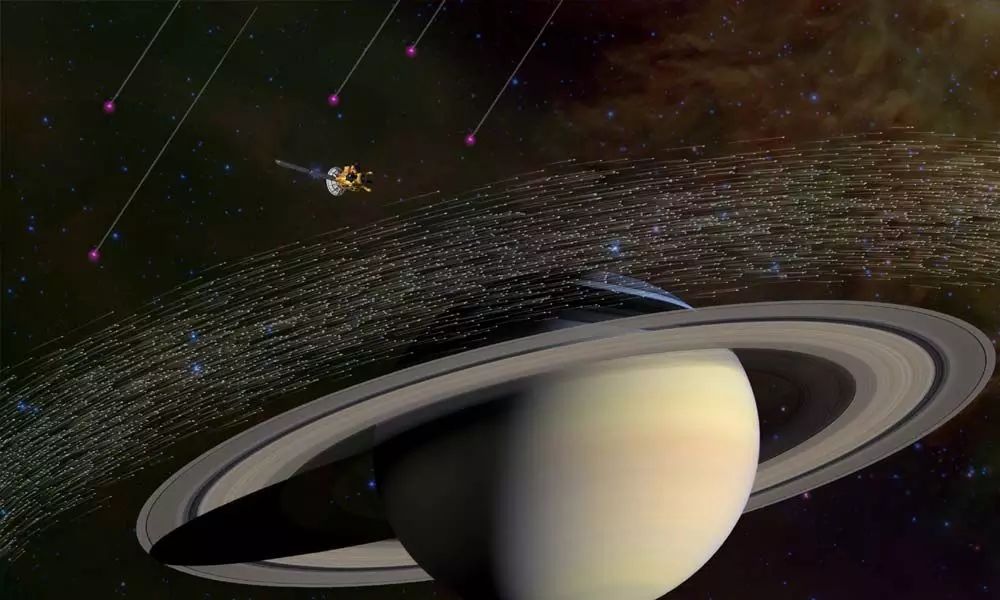Live
- STEM hiring to rise by 15-20 pc by 2027: Report
- UK Regulator Accuses Apple and Google of Stifling Mobile Browser Competition
- Tamil Nadu CM Stalin Invites Telangana CM Revanth Reddy for Meeting on Delimitation Impact
- Essential career tips for freshers
- Tips to avoid unnecessary mistakes while studying abroad
- Holi Festival: Liquor Outlets to Remain Closed for Holi in Hyderabad
- iQoo launches Neo 10R model
- Hyderabad: Woman Alleges Caste-Based Harassment by Roommates in Shaikpet
- Markets end on flat note
- Nifty Metal index falls after US tariffs
Space Calendar December 2021: Events Occurring in Space


Space Calendar December 2021
Make yourself aware of the happenings in the space this month, December 2021.
These dates are subject to change. Launch dates are taken from Space.com.
December 1: SpaceX will launch another batch of approximately 53 Starlink satellites into orbit from Cape Canaveral Space Force Station in Florida, at 6:20 a.m. EST (2320 GMT).
December 4: The only total solar eclipse of the year (and the last total solar eclipse until 2023) will be visible from Antarctica. Skywatchers in South Africa, Namibia, the southern tip of South America and some islands in the South Atlantic will be able to see at least a partial solar eclipse, with the moon blocking a portion of the sun from view.
December 4: The new moon arrives at 2:44 a.m. EST (0744 GMT).
December 4: A United Launch Alliance Atlas V rocket will launch the STP-3 rideshare mission for the U.S. Space Force. It will lift off from Cape Canaveral Space Force Station in Florida, during a two-hour launch window that opens at 4:04 a.m. EST (0904 GMT).
December 6: Conjunction of the moon and Venus. The waxing crescent moon will pass about 2 degrees to the north of Venus. Look for the pair above the western horizon after sunset.
December 7: Conjunction of the moon and Saturn. The waxing crescent moon will swing about 4 degrees to the south of Saturn in the evening sky.
December 8: A Russian Soyuz rocket will launch the Soyuz MS-20 crew capsule to the International Space Station with Russian cosmonaut Alexander Misurkin, Japanese billionaire Yusaku Maezawa and video producer Yozo Hirano. It will lift off from the Baikonur Cosmodrome in Kazakhstan at 2:38 a.m. EST (0738 GMT).
December 9: Conjunction of the moon and Jupiter. The waxing crescent moon will swing about 4 degrees to the south of Jupiter in the evening sky.
December 9: A SpaceX Falcon 9 rocket will launch NASA's Imaging X-ray Polarimetry Explorer (IXPE). It will lift off from Launch Complex 39A at NASA's Kennedy Space Center in Florida, during a 90-minute launch window that opens at 1 a.m. EST (0600 GMT).
December 12: A Russian Proton rocket will launch two new satellites for the Russian Satellite Communications Company. The mission will lift off from the Baikonur Cosmodrome in Kazakhstan at 7:20 a.m. EST (1220 GMT).
December 13-14: The annual Geminid meteor shower, one of the best meteor showers of the year, peaks overnight. The Geminids are active December 4-17 often produce up to 50 visible meteors per hour, but this year the 78% full moon will outshine the fainter meteors.
December 18: NASA's James Webb Space Telescope is scheduled to lift off from the Guiana Space Center in Kourou, French Guiana at 7:10 a.m. EST (1210 GMT), on an Ariane 5 ECA rocket.
December 18: The full moon of December, known as the Full Cold Moon, occurs at 11:37 p.m. EST (0437 December 19 GMT).
December 18: A SpaceX Falcon 9 rocket will launch the Turksat 5B communications satellite from Cape Canaveral, Florida, during a 90-minute launch window that opens at 10:58 p.m. EST (0358 December 19 GMT).
December 20: Russia's Angara-A5 rocket will launch on its third orbital test flight, from the Plesetsk Cosmodrome in Russia.
December 21: The solstice arrives at 10:59 a.m. EST (1559 GMT), marking the first day of winter in the Northern Hemisphere and the first day of summer in the Southern Hemisphere.
December 21: A SpaceX Falcon 9 rocket will launch a Dragon cargo resupply mission (CRS-24) to the International Space Station. It will lift off from Launch Complex 39A at NASA's Kennedy Space Center in Florida, at 5:06 a.m. EST (1006 GMT).
December 21: A Japanese H-2A rocket will launch the Inmarsat 6 F1 communications satellites from the Tanegashima Space Center in Japan, during a two-hour launch window that opens at 9:33 a.m. EST (1433 GMT).
December 21-22: The annual Ursid meteor shower peaks overnight. Typically active around December 17-26, the Ursids produce about five to 10 visible meteors per hour on the morning of the peak.
December 27: A Russian Soyuz rocket will launch 34 satellites into orbit for the OneWeb internet constellation. The mission, called OneWeb 12, will lift off from the Baikonur Cosmodrome in Kazakhstan.
Source: SPACE.com

© 2025 Hyderabad Media House Limited/The Hans India. All rights reserved. Powered by hocalwire.com






